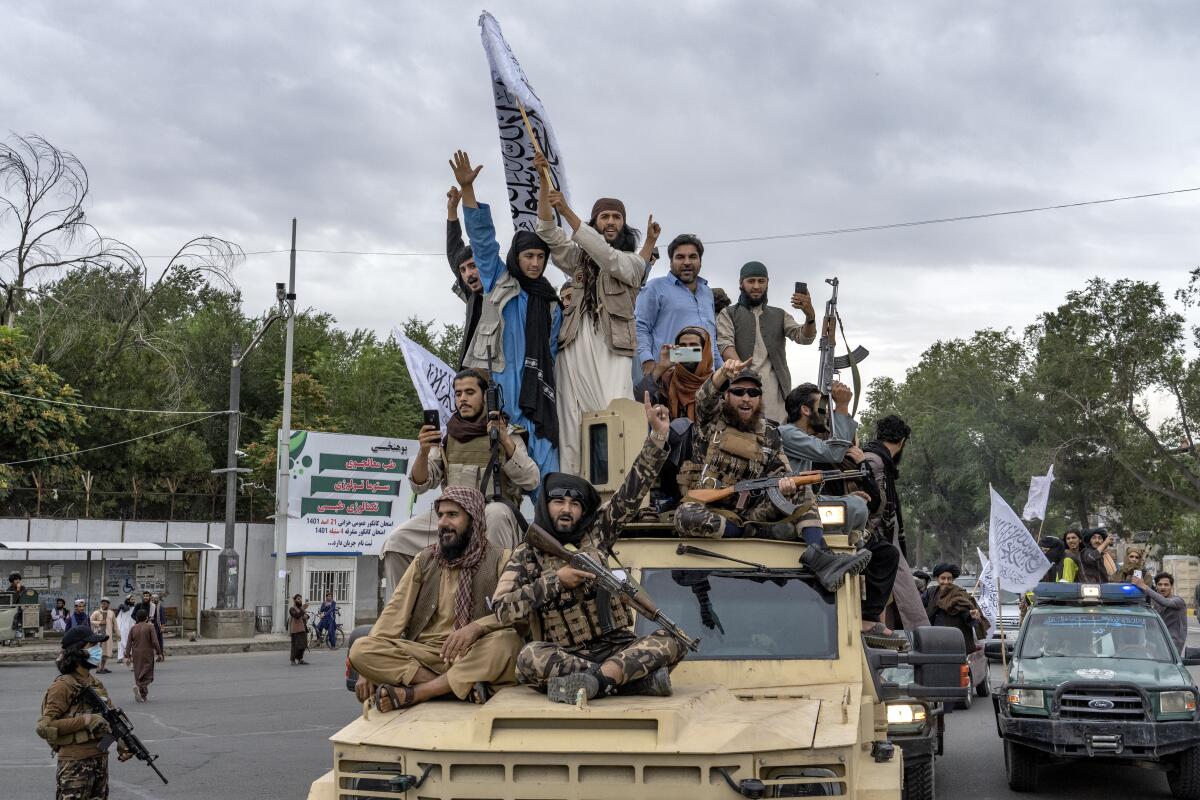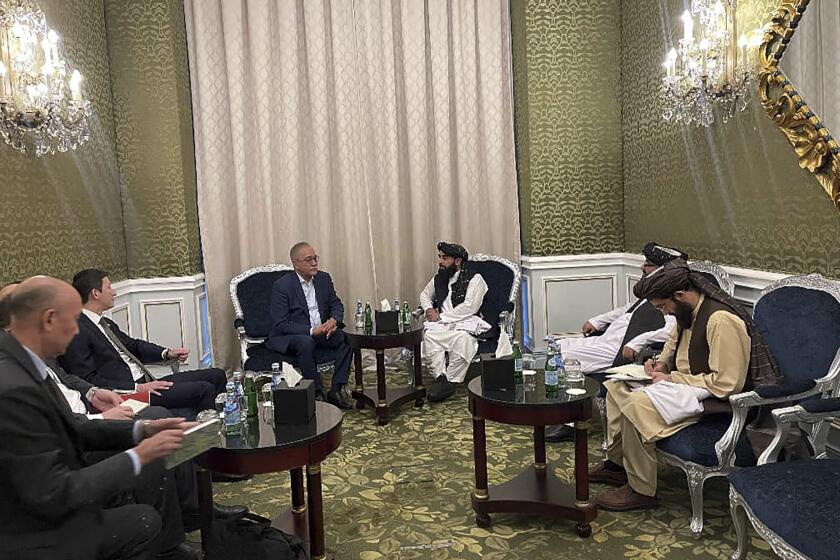The Taliban disavows many Afghan diplomatic missions abroad. Afghans call that impractical

- Share via
ISLAMABAD, Pakistan — The Taliban on Tuesday disavowed many Afghan diplomatic missions overseas, saying it will not honor passports, visas and other documents issued by diplomats associated with Afghanistan’s former Western-backed administration.
It’s the Taliban’s latest attempt to seize control of diplomatic missions since returning to power in 2021. Many Taliban leaders are under sanctions, and no country recognizes them as Afghanistan’s legitimate rulers.
The country’s seat at the United Nations is still held by the former government that was led by Ashraf Ghani, but the Taliban wants it.
In a statement posted to social media platform X, the Ministry of Foreign Affairs said documents issued by missions in London; Belgium; Berlin and Bonn, Germany; Switzerland; Austria; France; Italy; Greece; Poland; Australia; Sweden; Canada and Norway are no longer accepted and the ministry “bears no responsibility” for those documents.
After the Taliban barred women from most education and jobs. half of Afghanistan’s population is locked out of work when the country’s economy is worse than ever.
The documents affected include passports, visa stickers, deeds and endorsements.
The ministry wrote that people in those countries will need to approach embassies and consulates controlled by the Taliban’s Islamic Emirate of Afghanistan government instead.
“All Afghan nationals living abroad and foreigners can visit the IEA political and consular missions in other countries, other than the above-mentioned missions, to access consular services,” it said.
The Taliban did not immediately respond to questions.
One Afghan national living in London, Asad Mobariz, expressed disappointment and frustration with the decision. The master’s student called it unfair and impractical to expect Afghans in affected countries to travel abroad for consular services.
“This decision disregards our needs and places an undue burden on us,” he told the Associated Press. “These services are crucial for my ability to travel, work and maintain my legal status in the U.K.”
A Taliban delegation is attending a United Nations-led meeting in Qatar on Afghanistan after organizers said women would be excluded from the talks.
The decision would create immense hardship for the Afghan population in Europe and lead to increased financial strain and potential legal issues for those unable to access consular services locally, he said.
Another Afghan national, Adnan Najibi, who lives in Germany, said discrediting embassies was unlikely to benefit the Taliban.
“I live in a small town with a relatively low population; however, I still see that there are hundreds of Afghans living here,” Najibi said. “If someone previously obtained an Afghan passport, marriage certificate or any other document in a day, it may now take weeks or even longer.”
In March 2023, the Taliban said it was trying to take charge of more Afghan embassies abroad. Its chief spokesman, Zabihullah Mujahid, said the administration had sent diplomats to at least 14 countries.
The new developments mean the closest available Afghan embassies for people in Europe are likely to be in Spain and the Netherlands. In October, those two countries said they were working with Taliban authorities in Kabul after the Taliban suspended consular services at the embassies in London and Vienna over their “lack of transparency and cooperation.”
The Taliban leader issued the warning at a time when the country is in the grip of humanitarian crises and is isolated on the global stage.
Some countries retain an active diplomatic mission in Afghanistan, including Pakistan and China.
Michael Kugelman, director of the Wilson Center’s South Asia Institute, said the Taliban was confident and emboldened, buoyed by the informal recognition they have received from many countries.
They appeared to be working to force Afghans to engage with the Taliban instead of with diplomats loyal to the former administration, he said.
“It’s about giving the Taliban more diplomatic clout abroad and consigning the pre-Taliban holdouts to irrelevance. The fact that many of these missions aren’t very active anyway makes Taliban efforts easier to pull off. It’s like pushing on a door that’s already open.”
The Taliban has received informal recognition through bilateral ties with countries such as Russia, China, Iran and Pakistan, including high-level meetings with those countries.
Members of the group were also the Afghan representatives at United Nations-hosted talks on Afghanistan in Doha, Qatar, in July, although the U.N. stressed that this did not amount to official recognition.
A year of Taliban rule sees Afghanistan’s economy in ruins and hope and security for Kabul’s residents in short supply.
Also on Tuesday, the U.N. mission in Afghanistan said local intelligence officials in May had forcibly closed the office of a female-led nongovernmental group for allowing some of its female employees to physically report to work.
The NGO was allowed to reopen days later after signing a letter saying it would not allow female employees to come to the office, according to the mission’s latest report on human rights in Afghanistan. The report did not disclose the location for “protection reasons.”
Restrictions on women and girls are a major obstacle to the Taliban gaining official recognition as the country’s legitimate government.
The Taliban government has stopped female education beyond sixth grade and banned women from many jobs and most public spaces.
Butt writes for the Associated Press.
More to Read
Sign up for Essential California
The most important California stories and recommendations in your inbox every morning.
You may occasionally receive promotional content from the Los Angeles Times.














